Pan-African Parliament Hansard Report, Sixth Session of the Second Parliament
Monday, January 16, 2012
| Hon. Livio Fernandes Lopes | Cape Verde |
| Hon. Jorge Pedro Mauricio | Cape Verde |
| Hon. Felisberto Vieira Filu | Cape Verde |
| Hon. Justiniano Lopes de Sena | Cape Verde |
| Hon. Patrick Mwalula Mucheleka | Zambia |
| Hon. Mutinta Christine Mazoka | Zambia |
| Hon. Davies Mwango | Zambia |
| Hon. Dorothy Mupeta Kazunga | Zambia |
| Hon. Jeremie Ngendakumana | Burundi |
| Hon. Bonaventure Niyoyankana | Burundi |
| Hon. Jean Minani | Burundi |
| Hon. Fides Sinankwa | Burundi |
| Hon. Innocent Nkurunziza | Burundi |
| Hon. Jeanne d’Arc Nyinawase | Rwanda |
| Hon. Gallican Niyongana | Rwanda |
| Hon. Awad Hag Ali Ahmed | Sudan |
| Hon. Gina Michele Sanze | Central African Republic |
| Hon. Socrate Bozize | Central African Republic |
| Hon. Bertin Bea | Central African Republic |
| Hon. Dieudonne Koudoufara | Central African Republic |
| Hon. Lucky Mulusa | Zambia |
